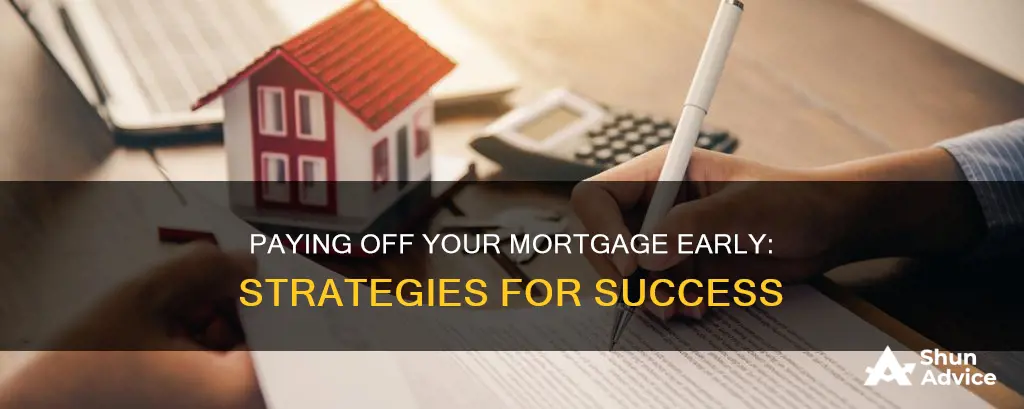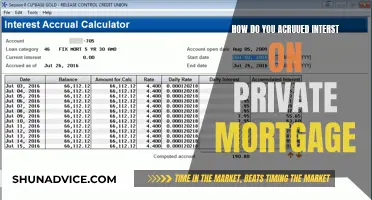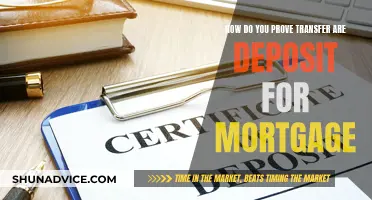
Paying off your mortgage early can be a great way to save money and build equity. There are several strategies you can use to achieve this, such as making extra payments towards your principal balance, refinancing to a lower interest rate or shorter term, or simply increasing your monthly payments by a small amount each month. It's important to consider your financial situation and goals when deciding whether to pay off your mortgage early, as there may be other investments or debts that could take priority. Creating a budget and cutting back on unnecessary expenses can also help you free up more money to put towards your mortgage.
| Characteristics | Values |
|---|---|
| Benefits | Build equity, save money, bolster financial stability, endure turbulent housing market conditions |
| Strategies | Dollar-a-month strategy, make extra payments, budget, cut expenses, increase income, refinance, pay windfalls, bonuses, tax returns, credit card rewards |
| Considerations | Prepayment penalties, opportunity cost, savings for emergencies, other debts with higher interest rates |
What You'll Learn

Make overpayments
Making overpayments is a great way to pay off your mortgage early. Overpaying your mortgage means paying more than the minimum amount or the normal monthly payment set by your lender, helping you become mortgage-free sooner. The benefits of overpaying include earning a tax-free return, getting access to better mortgage deals, and reducing your living costs.
Before making overpayments, it is important to check with your lender if there are any prepayment penalties or limits on how much you can overpay. Many mortgage loans do not have prepayment penalties, but it is always good to confirm. Fixed-rate mortgages typically have an annual overpayment limit of 10% of the total outstanding mortgage balance, while there is usually no limit for lender standard variable rates.
When you make an overpayment, your lender will likely offer you two options: reducing the next month's payment by the amount you've overpaid or keeping payments the same and reducing your mortgage balance. It is important to specify that you want any overpayments to reduce your mortgage balance, which will have the same effect as shortening the term. This way, you will save money on interest and pay off your loan faster.
To make the most of overpayments, consider making regular monthly or even weekly overpayments. This will help you save more on interest. You can also choose to pay a lump sum overpayment if you have saved more that way. Additionally, if you receive any unexpected windfalls, such as holiday bonuses, tax returns, or credit card rewards, consider putting them towards your mortgage.
While making overpayments can help you pay off your mortgage early, it is important to balance this with other financial considerations. For example, ensure you have an emergency fund in a top savings account before using extra income to overpay your mortgage. Additionally, clear any high-interest credit cards or loans before overpaying your mortgage, as these are usually more expensive.
Employment Verification: A Crucial Step in Mortgage Approval
You may want to see also

Save windfalls
Saving windfalls is a great way to pay off your mortgage early. A windfall can be a bonus at work, an inheritance, a tax refund, or a family gift. While you may be tempted to spend this money, putting it towards your mortgage can help you save on interest and pay off your loan faster.
If you receive a windfall, consider putting some or all of it towards your mortgage principal. This can significantly lower your long-term interest costs. For example, if you receive a $5,000 bonus at work, putting that money towards your mortgage could save you thousands in interest over the life of the loan.
It's important to note that some lenders may charge a prepayment penalty if you pay off your mortgage early. Be sure to check with your lender to see if there are any fees associated with early payoff. In some cases, you may be able to make additional payments towards your principal balance without incurring a fee.
Additionally, you can make a lump-sum payment towards your mortgage, which is known as a mortgage recast. This is a recalculation of your mortgage after you make a large payment. As a result, your lender will adjust your monthly payment and interest rate to match your lower balance for the remainder of the loan. This can help reduce the amount of interest you pay and lower your monthly payment, but there may be costs associated with the recast itself.
While saving windfalls and making extra payments can be a great strategy for paying off your mortgage early, it's important to balance this with your other financial goals and priorities. Ensure that you are not compromising your emergency fund or other investments to pay off your mortgage early. It is always a good idea to consult a financial advisor to determine the best course of action for your specific situation.
Wall Street's Mortgage Business: How It Works
You may want to see also

Cut back on expenses
One of the most effective ways to pay off your mortgage early is to cut back on expenses. This can be achieved by making a budget and sticking to it. Calculate your income, list your expenses, and subtract the expenses from your income to ensure you're not overspending.
A good place to start cutting back is your grocery budget. Consider changing stores or shopping sales and buying in-season produce. Cooking at home more often instead of eating out or ordering in can also save you a lot of money. Another way to cut back is to cancel any subscriptions you don't need, and to cut back on online shopping.
You can also save money by doing an insurance coverage check-up. An independent insurance agent can shop rates from multiple providers and may be able to get you a better deal.
If you receive any windfalls, such as work bonuses, tax refunds, inheritance, or other unexpected financial gains, put this money towards your mortgage.
It's important to note that paying off your mortgage early should not be at the expense of other financial priorities, such as building an emergency fund or saving for retirement.
Profiting from Real Estate Mortgages: A Beginner's Guide
You may want to see also

Refinance at a lower rate
One way to pay off your mortgage early is to refinance at a lower rate. Refinancing a mortgage means paying off an existing loan and replacing it with a new one. This can help you save money in the long run, as a lower interest rate will reduce your monthly payments and the total amount of interest you pay over the loan term.
For example, a $100,000, 30-year fixed-rate mortgage with an interest rate of 7% has a principal and interest payment of $665. That same loan at 5% reduces your payment to $536. By refinancing to a lower rate, you can save a considerable amount of interest over time.
However, refinancing can come with its own set of costs, typically ranging from 5% to 7% of the loan's principal. These costs include an appraisal, a title search, and application fees. Therefore, it's important to consider whether the benefits of refinancing outweigh these initial expenses. According to experts, it's generally worth refinancing if the break-even period, or the time it takes to recover these costs, is two years or less.
Additionally, when deciding whether to refinance, it's crucial to evaluate your financial situation and future plans. If you've already paid off a significant portion of your mortgage, refinancing might not be the best option. In such cases, making extra payments towards your principal balance can be a more effective strategy to pay off your mortgage early.
Overall, refinancing at a lower rate can be a powerful tool to pay off your mortgage early, but it should be approached with careful consideration of the associated costs and benefits.
FHA Mortgage Assumption: What You Need to Know
You may want to see also

Budget and track spending
Budgeting and tracking your spending is a crucial step in paying off your mortgage early. Here are some detailed and direct instructions to help you achieve this financial goal:
Create a Monthly Budget:
Start by listing your income sources and calculating your total monthly income. Next, list all your expenses, including fixed expenses (such as bills and existing loan payments) and variable expenses (such as groceries, entertainment, and discretionary spending). Subtract your total expenses from your total income to determine how much money you have left to work with.
Track Your Spending:
Once you have created your budget, the next step is to track your spending throughout the month. There are various methods and tools to help you with this process. You can use budgeting apps, spreadsheets, or even a simple notebook to record each purchase you make. Categorise your spending to match the categories in your budget, and be sure to save receipts so you can accurately track variable expenses.
Identify Areas to Cut Back:
As you track your spending, you will likely identify areas where you can cut back. For example, you may realise that you are spending more on eating out or groceries than you had initially planned. Look for ways to reduce spending in these areas without compromising your essential needs or quality of life. This might include cooking at home more often, shopping sales, or choosing more affordable entertainment options.
Reevaluate Your Budget Regularly:
Budgeting is an ongoing process, and it's important to reevaluate your budget regularly to ensure it remains realistic and effective. Life circumstances change, and so will your spending habits and income. Adjust your budget as necessary to reflect these changes and to ensure you stay on track with your financial goals.
Focus on Your Financial Goals:
Remember, paying off your mortgage early is a significant financial goal. Keep this goal in mind as you budget and track your spending. This will help you stay motivated and make informed financial decisions. It's important to ensure that paying off your mortgage early does not compromise your ability to achieve other financial goals, such as saving for retirement or paying off high-interest debt.
By following these steps and staying disciplined with your budget and spending, you can make great strides toward paying off your mortgage early and achieving financial freedom.
Strategies to Manage Mortgage Debt and Reduce Stress
You may want to see also
Frequently asked questions
There are several ways to pay off your mortgage early. You can make extra payments toward your principal balance, make overpayments, or refinance your mortgage to a loan with a lower interest rate or a shorter term. You can also cut down on unnecessary expenses and put any extra income toward your home loan.
Paying off your mortgage early can save you money on interest and boost your financial stability by cutting out future payments. It can also help you build equity and endure turbulent housing market conditions.
Some lenders may charge a prepayment penalty or early repayment charge (ERC) for paying off your mortgage early. This may depend on the type of mortgage you have and the lender's policies. It's important to check with your lender to understand any potential fees.







